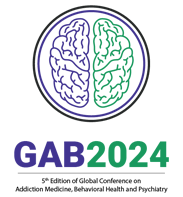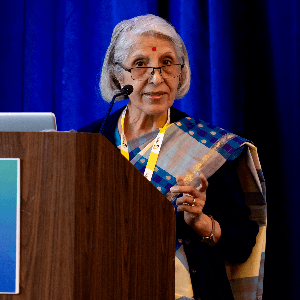Title : Neurobiology of addiction
Abstract:
Drug addiction can be considered a chronic brain disease that affects neurotransmission between neuronal circuits, control behaviour, emotion and cognition. It is characterised by an excessive engagement in drug use, unsuccessful attempts in controlling drug intake, an increase in anxiety and emotional pain
The neurobiological basis of drug addiction is supported by advances in neuroimaging studies. Functional magnetic resonance imaging (fMRI) suggests that various neurotransmitters; dopaminergic, glutamatergic, GABAergic and acetylcholinergic pathways, are significantly involved in addiction, with dopamine playing a key role in mediating reward perception and reward motivated behaviour. Stress is a risk factor in the vulnerability to the initiation and maintenance of drug abuse and relapse in subjects with history of drug abuse. Corticotropin-releasing factor (CRF), a neurotransmitter involved in the stress response, plays an important role in addiction
Substance abuse dysregulate key brain systems involved in motivation, reward, decision-making and memory. Dopamine, referred as the reward neurotransmitter, has long been considered to play important role in reward pathway leading to addiction. The mesolimbic dopaminergic "reward' pathway plays a key role in the pleasurable and positive reinforcing effects of drugs. Mesolimbic dopaminergic neurones in the ventral tegmental area project to brain regions including the nucleus accumbens and amygdala. GABA-ergic interneurones have key inhibitory or ‘braking’ effect on these dopaminergic neurones. A range of inhibitory receptors, including mu opioid, cannabinoid CB1 and nicotinic, regulate GABA-ergic activity, which in turn modulate the mesolimbic dopaminergic neurones. Activation of inhibitory receptors results in release of endogenous endorphins by alcohol, stimulants, or by consumption of opioids or cannabis, where as the GABA-ergic inhibition of the dopaminergic neurone is reduced.
As an individual becomes addicted, there is a shift away from this positive reinforcement to the compulsive, habitual drug-seeking behaviours as is seen by cravings or withdrawal symptoms. However, other neurotransmitters such as, endogenous opioid system, are likely to be equally important in pleasure and reward in drug addiction.
For many drugs of abuse, continual drug use results in tolerance. This is particularly evident for alcohol and opiates, although less so for stimulants. Thus tolerance is driven by neuroadaptive changes in which receptors activated by the drug are downregulated or exhibit reduced sensitivity resulting in homeostatic imbalance of brain function. Abrupt cessation of the drug results in withdrawal because of non availabilty of drug needed to maintain the homeostatic balance. The exact underpinning neurobiology of tolerance and withdrawal varies because of the range of neurotransmitter systems involved in the pharmacology of various drugs of abuse.
Recent research has highlighted the importance of other neurotransmitters, such as endogenous opioids in reward and addiction. Endogenous opioid receptors consist of three subtypes: mu, kappa and delta. The endogenous agonist at the mu opioid receptor is beta-endorphin, which has euphoric and analgesic effects. Changes in the availability of mu opioid receptors have been demonstrated in alcohol, heroin and cocaine addiction. Kappa opioid receptors are associated with dysphoria, and dynorphin is the endogenous agonist. Thus, mu and kappa have opposite effects, with stimulation of kappa receptors reducing the pleasurable effects associated with mu stimulation. Delta opioid receptors are important in analgesia and have enkephalins as the endogenous agonist. By empowering the audience with knowledge and resources, this presentation aims to foster Neurobiological basis of Addiction
Audience Take Away Notes:
- This talk would enlighten the audience / researchers in understanding the underpinnings of Neurobiology of Addiction
- Researchers would understand important role of various neurotransmitters involved in drug addiction
- How excessive use of drugs, unsuccessful attempts in controlling drug intake results in tolerance and increase in anxiety and emotional pain



